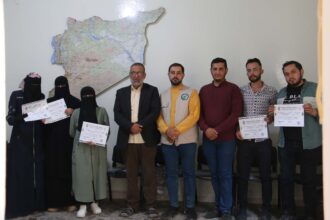Discrimination Against Syrian Women, Northern Syria as a Case Study

Introduction:
Many Syrian women suffer from various forms of discrimination, whether on legal, social, or economic levels. This issue has significantly worsened due to the ongoing war in the country, making women more vulnerable to violence and abuse. Our study observed a concerning acceptance and normalization of this discrimination, especially among women themselves, reflecting a profound societal influence and lack of awareness about equality.
Key Forms of Discrimination:
- Legal Discrimination: Syrian women suffer from discriminatory personal status laws that reduce their rights compared to men, especially in matters of marriage, divorce, inheritance, and child custody. There are also laws that prevent them from traveling without a “mahram” or a male relative.
- Violence Against Women: Forms of violence against women include domestic violence, forced marriage, rape, and human trafficking. The spread of these forms of violence has increased due to the war and armed conflicts, with 45% of violence cases occurring in northern Syria. Domestic violence constitutes the majority of this percentage, nearing 85%, while 16% is due to the authority of the de facto powers in the north.
- Economic Discrimination: Women face greater difficulties in obtaining suitable job opportunities, and their wages are lower compared to men’s, with disparities ranging from 10-50% in some cases. They also bear a greater burden of household chores and childcare.
- Social Discrimination: In some Syrian villages and families, women are regarded as second-class citizens and do not enjoy the same rights and duties as men. They are often denied secondary education and beyond, with 60% of those surveyed citing family reasons for not completing their studies.
- Societal Culture: Syrian society has a strong patriarchal culture that views women as inferior to men and limits their participation in public life and decision-making. 85% believe that women are not equal to men, and this culture hinders efforts for change and strengthens resistance to traditional ideas.
- Displacement and Refugee Status: Displacement and refugee situations have led to the fragmentation of families and communities, increasing women’s exposure to violence and exploitation, and making it difficult to reach them and provide necessary support. This is one of the reasons for the suffering observed in our field study.
- Lack of Resources: Organizations working in the field of women’s rights suffer from a lack of financial and human resources, which limits their ability to implement their programs and activities. Over the past two years, resources for women’s rights have been reduced by over 60% compared to previous years.
- Fear of Retaliation: Activists in the field of women’s rights face threats, arrest, and violence, creating an atmosphere of fear and limiting their participation.
- Focus on Humanitarian Issues: Women’s issues and rights are often overlooked in favor of urgent humanitarian issues, such as providing food, shelter, and healthcare.
- Difficulty Reaching Remote Areas and Providing Necessary Support to Women and Assessing Their Situations.
- Political Changes: Political changes in northern Syria directly affect the situation of women, as there is a difference between the areas under the Salvation Government and those under the Interim Government.
Reasons for Discrimination:
- Traditions and Customs: Prevailing traditions and customs in some Syrian villages and families reinforce concepts of discrimination against women.
- War and Conflict: The ongoing war has exacerbated discrimination, making women more vulnerable to violence and abuse.
- Lack of Rule of Law: The collapse of the state and absence of the rule of law in some areas have led to the spread of violence and crime, increasing women’s suffering.
Efforts to Combat Discrimination:
Many Syrian civil society organizations provide support to women survivors of violence and raise awareness about the importance of gender equality. Several international institutions also support Syrian women and work to ensure their rights. The active participation of Syrian women in fighting discrimination through civil, political, and awareness activities is evident, as demonstrated in our experience at the Syrian Future Movement’s northern offices, highlighting the significant role of Syrian women in their quest to reject discrimination.
Future Challenges:
Rebuilding Syria will be a major challenge, and this process must include ensuring women’s rights and empowerment. It is essential to combat extremist ideas that justify discrimination against women and build a democratic society that guarantees equality for all citizens, regardless of gender.
Conclusion:
Discrimination against women in Syria is a complex issue that requires concerted efforts from all concerned parties. The international community, local authorities, civil society organizations, and women themselves must work together to eliminate this discrimination and build a better future for Syrian women. The Office of Family Affairs at the Syrian Future Movement recommends the following:
- Work to change societal views on women and raise awareness of their rights.
- Amend discriminatory laws and enact new legislation that ensures gender equality, even if temporary, until a comprehensive solution for Syria is found.
- Combat all forms of violence against women and provide support for survivors.
- Empower women economically by providing job opportunities and vocational training.
- Encourage women’s participation in political life and decision-making, and call on local authorities to compete over women’s representation within their institutions.
- The international community should provide financial and political support to civil society organizations working on women’s rights in Syria.
Waheba Al-Masri
Office of Family Affairs
Research and Studies Department
Articles
Syrian Future Movement (SFM)






